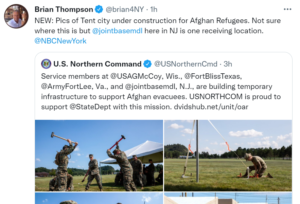InsiderNJ Exclusive: The Long-Persecuted Hazara People Need Special Status

The Hazara people of Afghanistan, who speak Farsi, were persecuted by the Taliban between 1996 and 2001, according to Human Rights Watch. Hazara Leaders say the Taliban have already begun targeting their people in Afghanistan. There’s a significant Hazara community in the New York and New Jersey areas, and many are concerned about family members still in Afghanistan.
Today, Governor Phil Murphy said a significant number of Afghan refugees will land at the  Joint Base McGuire-Dix-Lakehurst. Brian Thompson of NBC News tweeted pictures of the tent city presumably under construction as a receiving location for incoming refugees fleeing the Taliban-controlled Middle Eastern country.
Joint Base McGuire-Dix-Lakehurst. Brian Thompson of NBC News tweeted pictures of the tent city presumably under construction as a receiving location for incoming refugees fleeing the Taliban-controlled Middle Eastern country.
“I wrote a letter to the president yesterday,” Governor Phil Murphy said earlier today. “We want to do the right thing. …New Jersey will be doing its part. The feds are running this. We want to make sure we do our share.”
The refugees from Afghanistan will come through Dulles Airport in Northern Virginia to the Joint Base in Lakehurst. Murphy said New Jersey will be getting the Afghan refugees “imminently,” but emphasized that he has scant details at the moment.
Whether any Hazara people are among the refugees heading for New Jersey is in question at this moment, but what is not is their status in Afghanistan right now as a severely at-risk group.
Homira Rezai is a human rights activist based in London. She's been speaking up about the persecution of the Hazara people for years. Rezai and her family fled Afghanistan when she was 13 years old. The 27-year-old, who is also a medical scientist, says Hazara people in Afghanistan are terrified because they remember how the Taliban went after them because of their Shia Islam faith. The Taliban are Sunni Muslims.
Rezai, who has family in Afghanistan, says the Taliban can easily identify many Hazara people and have already started going after Hazara people.
“We are very different in terms of our physical features,” Rezai said, “so we look very Far East Asian because of our origin, which is Turkic Mongols.”
InsiderNJ’s Christine Sloan spoke to Rezai about the danger the Hazara people now face in Afghanistan.





